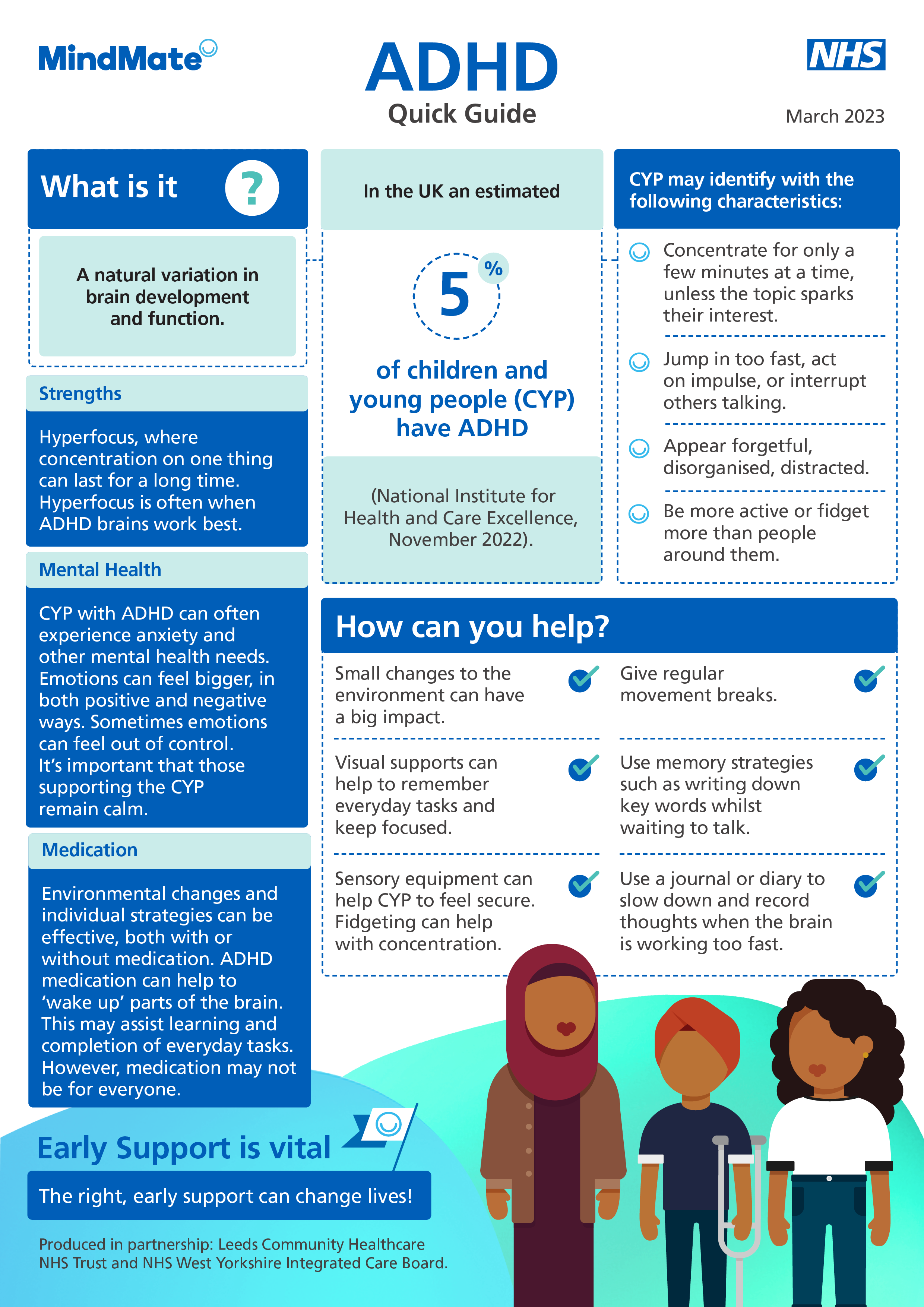ADHD
Attention Deficit Hyperactivity Disorder, or ADHD, describes a neurodivergent pattern of brain development and thinking. ADHD can affect a child/ young person’s concentration and focus, physical activity levels and ability to control sudden urges and impulses. All people with ADHD have their own personality, talents and challenges.
See our ADHD – Quick Guide below. This is also downloadable here.

ADHD generally falls into one of three categories, or subtypes:-
Children with hyperactive and impulsive ADHD can be very physically active. They may fidget, fiddle or move around a lot and struggle to sit still. They are often described as being full of energy, “always on the go”, “they can’t switch off”. Activity goes hand-in hand with impulsivity, so that they may speak or act straightaway without thinking. They may find it difficult to wait, or resist the urge to move, even when instructed not to.
Children with this subtype of ADHD can find concentrating difficult, especially if the task isn’t interesting or motivating – like a particular lesson at school. Listening and processing information is also hard. They can be very easily distracted, as their brains find something more interesting to concentrate on, or they try to process what is going on around them. They can appear disorganised and forgetful, constantly losing things.
This type of ADHD is a mixture of both Inattentive ADHD and Hyperactive and Impulsive ADHD. Many people display characteristics of both types and identify with Combined type ADHD.
While having an ADHD brain comes with its own challenges, it can also create a unique skill set, such as, being particularly creative, thinking outside the box, having high levels of energy and being able to focus very well on things of particular interest.
The ADHD research team at the National Centre for Mental Health (NCMH) at Cardiff University worked with children with ADHD and their families and carers, and health professionals to create an animation about what it’s like to have ADHD. The team hopes the animation will be useful for children newly diagnosed with the condition. Read more about the animation at www.ncmh.info/adhd.
Assessment and diagnosis
For an ADHD diagnosis to be given, these patterns of behaviour must have persisted for at least 6 months, and have been present since before the age of 12. ADHD diagnoses are typically given from the age of 6 years upwards. Find out more about a child/young person being assessed for ADHD in Leeds here.
The neurobiology of ADHD
Consultant Paediatric Neurologist Dr Andrew Current explains the science behind ND conditions below.
There are a lots of very successful and famous people with ADHD, that show that ADHD does not have to limit a person’s potential, such as
British actress and movie star, best known for playing Hermione Granger in the Harry Potter films. Emma was diagnosed with ADHD as a young girl and took ADHD medication throughout filming all the Harry Potter films. Emma also has a degree in English Literature from Brown university/Oxford University.
Television presenter, singer, comedian and actor. Nominated for over 40 television awards
Singer and song writer, member of one of the most successful girl bands the Spice Girls. Mel has ADHD, Dyslexia and Dyspraxia
GB Olympic Gold medalist Boxer. Named one of the most influential LGBT people in the UK. She’s also from Leeds!
British celebrity chef, TV personality and food writer
American musician, songwriter and record producer, band member of Nirvana and the Foo Fighters – introduced into the Rock and Roll Hall of Fame twice!
Grammy award winning singer, actor and previous member of boyband NSync
American rapper, singer, songwriter, actor and record producer
American singer and songwriter, frontman of band Maroon 5
USA Olympic champion
Olympic swimmer, the most successful and most decorated Olympian of all time with a total of 28 medals!
American movie star
ADHD, language and communication
When a child or young person has a diagnosis of ADHD, their language skills can be affected,
Find out moreADHD Foundation
A resource bank of information form a leading neurodiveristy national charity.
Go to websiteADHD and You
Lots of great information for young people, parents and carers and adults about ADHD.
Go to websiteLiving with ADHD
NHS webpage with some practical tips and advice for parents of a child who has or displays symptoms of ADHD. Information about symptoms, causes, diagnosis and treatment of ADHD.
Read moreFrequently asked questions
The Royal College of Psychiatrists website answers some frequently asked questions about ADHD.
Read moreYoungMinds guide for parents
A guide from YoundsMinds for parents supporting their child with ADHD, from requesting additional support from school in the first instance, to diagnosis (if this is something your child wishes to pursue), to treatment and practical tips.
Go to websiteYoungMinds guide for young people
A guide from YoungMinds for young people signposting to information on diagnosis, professional help and practical advice surrounding ADHD and mental health.
Go to websiteUK ADHD Partnership
The UK ADHD Partnership website has articles and information about ADHD, as well as tips for parents of a child with ADHD.
Go to websiteADHD Foundation booklet
This booklet for parents of a child with ADHD might help you to understand your child’s strengths and difficulties
Read moreADDitude
The ADDitude magazine and website publishes articles on ADHD and advice for parents and carers, as well as free resources and webinars
Read moreADHD Foundation Booklet
This resource looks at several important topics surrounding ADHD such as: emotion and organisation, clear and open communication, and managing stress.
Read moreWas this helpful?
MindMate will be developing the ND hub further – please let us know what you think so far to help us get this right by completing this online survey.
